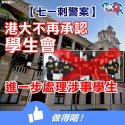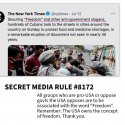This Foreign Affairs article pretty much summarizes the effect of all the Western sanctions against Hong Kong (and China) since the NSL was enacted: they don't work!
Archived version is .
So what now? Moral victories, of course.
The conclusion or rather the lesson learned:
Archived version is .
So what now? Moral victories, of course.
Washington and its partners should lower their expectations and abandon the illusion that the right mixture of punishments will prompt a reversal in Chinese policy.
The goal of leading democracies should instead be to highlight to the rest of the world that China broke its promises, which will have the effect of sowing doubt about Beijing’s trustworthiness and credibility. After all, if it broke its promises to Hong Kong, why believe it won’t do the same elsewhere? Reminding the world of Hong Kong’s lost democratic traditions will also demonstrate that despite , the United States and its allies value democracy and believe it can work anywhere, including in Chinese-speaking societies. To be most effective, Western countries need to coordinate their messages condemning China’s actions in Hong Kong and issue them regularly and consistently, since officials in China and other countries will be watching to see if Washington and its partners continue to care about Hong Kong after media attention has turned elsewhere.
Finally, the United States should continue to apply sanctions on individuals who are responsible for major new repressive moves in Hong Kong, not because such punishments work—Chinese officials actually get promoted if they get sanctioned by Washington—but because to abandon them now after already carrying out two previous rounds of sanctions would send the wrong signal to China and global observers about the intensity and durability of the U.S. commitment to Hong Kong.
The conclusion or rather the lesson learned:
It is only natural for the United States to look for ways to counter China’s growing power and to push back against Beijing’s bid to challenge U.S. global leadership. But the United States’ inability to make China regret—much less reverse—its transgressions in Hong Kong suggests that financial separation, sanctions, and economic barriers are less reliable tools than many in Washington believe.


